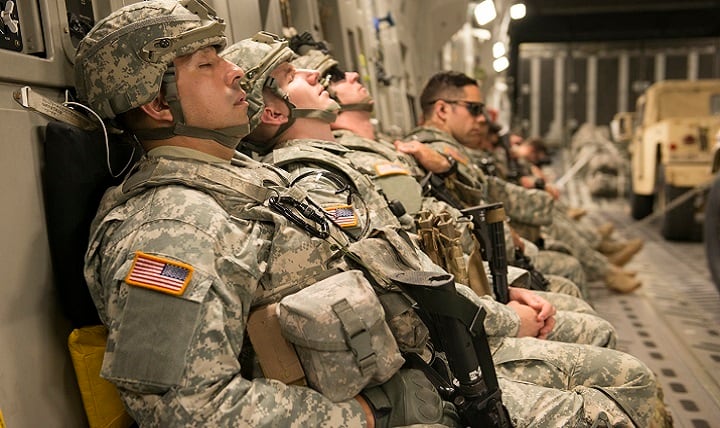Special operators may get a 360-degree tool that will help them manage, improve and restore what might be the secret ingredient to fighting at the leading edge – sleep.
U.S. Special Operations Command recently awarded a $1.29 million contract to Aptima, Inc. to develop a program called RESTORE: Restorative and Efficient Sleep Technologies for Optimizing Operator Resiliency and Effectiveness.
Company officials told Military Times that they aim to provide a “holistic sleep optimization and remediation platform.”
Is it an eye mask? A pill? A massage chair? Soothing ocean wave sounds?
Maybe all of the above with a healthy dose of science.
RELATED

Tim Clark, Aptima senior research engineer told Military Times that the company is six months into phase I of the two-year project.
The project has two main aims at this point, he said.
First to validate a series of wearable technologies and interventions. They’ll use commercially available products at first and test those in three lab studies with at least 40 college student volunteers each.
Then they’ll see if that tech can work with special operators and measure what the operators are doing now to manage their sleep, what’s effective and what’s not.
All of this data and experience blends together to create algorithms that can be applied to find the right mix of tech and habit to create better sleep for probably the highest stress, demanding job on the planet — special operator.
Retired Army Master Sergeant Scott Neil, a career Special Forces operator, did seven combat deployments after 9/11 before retiring.
He’s been on the short end of the sleep stick.
The brutal pace of pre-deployment prep before there were even boots on the ground often meant nights of perhaps four hours of sleep for months on end. And that was for a staff position he held later in his career.
Sleep experts recommend a minimum of six hours of sleep every 24 hours and suggest seven to eight hours as the goal.
“Now on the operator side, not only are you up for 18 hours, then you break your sleep up by getting up half an hour to be on guard, then 20 minutes to get back to sleep,” Neil said.
But operators are unlikely to turn down a mission or complain or even report if they’re having sleep problems. They don’t want to be pulled from the next mission or training cycle.
And those bad sleep habits compound the physical and psychological beating operators face, all rolling into their civilian lives when they get their eventual discharge, he said.
Some take sleeping pills, but those can have often dangerous side effects, he said.
Neil was weary of more sleep studies. He said through his career he saw plenty of studies or talk about sleep problems. He wants to see action taken to help current operators get better help and build better habits that don’t rely on unsustainable prescription drug use just to sleep.
“We were given a drug to make you go to sleep on flights. Some drugs you can take and it only has a two to four-hour effect and it only creates drowsiness because if you were attacked on the deployment, you can’t do anything,” he said.
Also, there were drugs to keep operators awake.
“It was always a measure for medication,” Neil said. “There was not this tactical athlete approach. Or this Zen alternative.”
Mostly it was up to the operator.
“Some guys would have masks on for sleeping, some guys would have mood music, all of these things but it was not a program. It was all self-discovery,” he said.
Aptima has partnered with researchers at the West Virginia University Rockefeller Neuroscience Institute, Oura Health Ltd, and Fusion Sport for the study and development, officials said.
The testing will help determine if the commercial products can be used for military personnel with their somewhat unique sleep demands, which only emergency responders come close to mirroring.
“Is it feasible to have intervention strategy for these wearables, could you have these, could you wear these in an operational environment, training is feasible but is the operational environment?” Clark said.
That’s the initial, general work. But the real task is to understand how to tailor sleep technologies, interventions, monitoring, planning and programming to the individual.
A sample of some of the questions Clark and his team will ask:
“How can you bank sleep in advance?” “How well do you clear a room based on your sleep profile?” “What are the downstream effects of any sort of cognitive ability you gain or lose as a result of sleep patterns?”
They’ll be looking at measures such as caffeine use, alcohol consumption, not eating meals, physical exertion and recovery.
That’s phase II of the project, diving in with SOCOM volunteers to measure their habits and test their rest while building ways for them to improve their sleep, he said.
Aptima works defense projects on performance augmentation and assessment, learning, training and other areas.
The company has worked on sectors of the Marine Corps’ Force Fitness Instructor program and more high-tech projects such as the Tactical Assault Light Operator Suit, or TALOS, basically an “Ironman” suit for soldiers.
The next 18 months will give them a footing in understanding where to go with the tech, but Clark said a follow on phase will be needed to build and implement the full suite of tools needed.
Todd South has written about crime, courts, government and the military for multiple publications since 2004 and was named a 2014 Pulitzer finalist for a co-written project on witness intimidation. Todd is a Marine veteran of the Iraq War.




